Another Timbre TimHarrisonbre
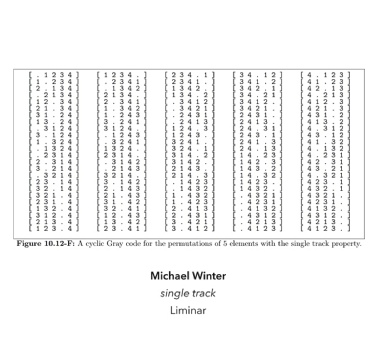
at170 Michael Winter - ‘single track’ (2015)
Performed by Liminar:
Alexander Bruck, viola Omar López, baritone saxophone
Wilfrido Terrazas, bass flute Jorge Amador, cello
Mónica López Lau, paetzold recorder Antonio Rosales, bass clarinet
Jonnathán Méndez, contrabass
A seven-part canon which starts fast and gradually slows down over its 45-minute duration, played by Mexico’s leading new music ensemble.
Interview with Michael Winter
single track is a really arresting piece that appealed to me immediately. At one level it’s obvious what’s happening – a 7-part canon that starts out fast and gradually slows down. But what else can you tell me about it?
In a way, the gradual slow down was an unintended consequence. My original idea was to write a piece that enumerated all ways of articulating a 6-note chord with 7 instruments bound by two morphological constraints: 1) that there was minimal timbral change over time (a permutation where only two elements swapped from moment to moment) and 2) that the voices were cyclic shifts of each other (a fancy way of saying a canon).
At first, I attempted to find a solution myself. It was painstaking and by no means a trivial problem to solve. From genetic algorithms to constraint programming, I tried several methods to no avail. Despite the simple, well-defined idea, the solution proved to be elusive.
So I hit the books searching for an abstraction of my musical problem in the literature of mathematics and computer science. Something I often do. I also had an idea where to start having worked before with minimal-change enumerations of n-ary words called Gray codes which can express permutations. I remembered reading about a Gray code where each position in the words is a cyclic shift of the others. In the computer science literature, this property—which is well-known in music as a canon or round—is called “single track” (hence the title of the piece).
However, knowing something exists still does not translate into an easy way of finding a solution. So the idea laid in wait for some time. Eventually, after putting the idea to rest for a while, I found a computational method that matched verbatim all the morphological constraints that I originally intended in a wonderful book called Matters Computational by Jörg Arndt. There was even a well-documented, efficient algorithm in the book that I could use to program the construction.
To circle back to your original question. One additional property that Arndt's solution had is that when each successive voice enters, the prior voices slow down. As previously mentioned, this was an unintended consequence. But it is those sorts of things and how the piece, in realization, becomes different from and more than the original concept that truly makes it what it is.
How did you come to work with Liminar? And tell me more about the ensemble?
In my opinion, Liminar is one of the premier new music ensembles in Mexico (or the world for that matter). In Los Angeles, I became friends with composer and vocalist Carmina Escobar, one of the co-founders and co-directors of the ensemble. Liminar eventually came to Los Angeles to play a concert of the work of Julián Carrillo at REDCAT. We also organized a concert at the wulf., an organization that I co-founded with Eric Clark in 2008 dedicated to the presentation of experimental music in Los Angeles. That is when I first met all the performers of the ensemble.
Over time, I became very close friends with the violist Alex Bruck (one of the other co-founders and co-directors of Liminar along with composer Carlos Iturralde). Anecdotally, shorty after Alex and I first met, we both went through a break up and decided to distract ourselves by taking a trip to the wine country of Baja California. I drove down from Los Angeles, rendezvoused with Alex at the Tijuana airport, and we continued downward to Ensenada where we met up with Willy Terrezas, the flutist from Liminar. That trip cemented our friendship.
Working with Liminar has been one of the great privileges / opportunities of my musical life. By now, we have collaborated on several projects. They are awesome performers in addition to being very kind and generous people; always willing to try new things and never saying something is impossible. The release of single track, some five years in the making, is a testament to their positive and relentless attitude.
Experimental music continues to be Euro- and North-American- centric. Liminar does just as much if not more than their counterparts in Europe and the US, often with significantly less resources. Something special is happening musically in Mexico and across the Americas south of the US border. Liminar is a reflection of and ardent contributor to that vibrancy. For many (colonial) reasons, musicians in Latin America have to work harder for their voices to be heard. That dynamic is starting to change and no doubt Liminar is one of the many driving forces behind a more global recognition and support of music from Latin America, which is very well-deserved and long overdue.
Tell me about your own background – how did you come to experimental music, where do you live and so on.
I started my musical life as a guitarist, but could never get over my stage fright. As a performance major at the University of Oregon, I began taking electronic music and composition courses. I also bought my first synthesizer (this was before personal laptop computers were ubiquitous). I had a wonderful teacher, composer Jeff Stolet, who exposed me to the European canon of avant-garde music and to some extent parallel trends in the US. At that time, I identified considerably with the music of György Ligeti and still acknowledge him as a significant influence of mine. It was actually through Ligeti that I was introduced to the music of Jim Tenney. I would go on to study with Jim at CalArts and we became close friends in the last few years of his life. That is really just the tip of the iceberg. I have had the great fortune of knowing and working with many of my musical and intellectual heroes from prior generations to my immediate contemporaries.
Just as much as I learned about music from Jim, he also imbued in his students a great sense of responsibility for fomenting their own musical community and being in charge of one's own musical life. In many ways, this led to the creation of the wulf. After 8 years, we lost the lease of the loft where we lived and hosted events. At that point, I decided to travel and have lived a rather nomadic life since. I spent over a year traveling in South America and then did a couple of longer stints in Mexico (where I lived with Alex) and at a residency in Stuttgart, Germany.
Currently, I am living in Berlin partly as result of circumstances induced by the pandemic. I was living in Mexico City about to move to Rio de Janeiro for a visiting teaching position at UNIRIO when the pandemic started spreading throughout the world. Because the situation was so nebulous at the time, I returned to the US to be closer to my family and hunkered down for 6 months in a somewhat secluded, family-owned apartment at the foot of the Smokey Mountains. In Tennessee, I was extremely isolated and for some time, I saw more black bears than people! But I tried to be productive. Between jaunts to a swimming hole I found in the national park, I started composing one of my most recent pieces which can also be attributed to my friendship with Alex and his extensive book collection.
Shortly before the pandemic, I found a curious book at Alex's apartment called Counterfeiting in Colonial Connecticut by Kenneth Scott. I started writing a piece titled after the book itself, which sets readings of early counterfeiting cases found in the compendium. I had no intention to reflect the current, tumultuous situation. That changed when the virus began circulating globally and when the protests sparked by the murder of George Floyd started. Because Floyd was being arrested for allegedly using a counterfeit $20 bill, the use of texts about counterfeiting in colonial America had undeniably acquired a whole new meaning and gravity. I decided to add the possibility of complementing readings from the Scott compendium with readings of texts I had written commenting and reflecting on the current situation and civil unrest. While I was reluctant to connect Floyd with counterfeiting and colonialism, his murder and the pandemic clearly demonstrated that inequalities accepted in colonial times have persisted.
That was my main focus throughout the isolation. The time was productive, the mountains were beautiful, and returning to the US proved to be a good temporary solution. But the isolation was getting to me so I started considering other options. Family and friends in Europe encouraged me to move to the EU but that seemed impossible because of the lockdowns. Despite this, I pursued the possibility only to find out that I was a dual US and German citizen all along. Of course, I knew my parents emigrated from Germany to Nashville, Tennessee where I was born and raised. What I did not know, is that Germany establishes citizenship by descent and my parents only naturalized after I was born. So I decided to say goodbye to my bear friends, got my German passport, and moved to Berlin where I have human friends, a musical community, and if necessary, could get health care without being financially destroyed, as is often the case in the US. In both Mexico and the US, my health insurance coverage was mediocre at best, which was also a consideration throughout even though I am in good health. I feel fortunate to be in Berlin and still have hope to eventually make it to Brazil for the visiting professorship.
For now, I am just trying to stay safe and work on music and related ideas. Guitarist Elliot Simpson and flutist Gemma Muñoz are recording Counterfeiting in Colonial Connecticut along with a piece called a lot of tiles (trivial scan) written for Omar López of Liminar (who will also participate in the recording). I am currently writing a new piece for Rebecca Lane (microtonal bass flute) and some other friends here in Berlin while collaborating with mathematician Felipe Abrahão of Brazil. We aim to prove conjectures I recently made in a book chapter proposing a digital phenomenology based on the work of our mutual friend and mentor, the mathematician Greg Chaitin. Greg is married to an expert on digital philosophy, Virginia Chaitin, who is working with us to formalize the phenomenology and address any wider philosophical implications. Basically, I am focusing on those aspects of my artistic life that I can do during pandemic lockdown: primarily composing, recordings, and research. I look forward to things getting better and returning to a more social life; sharing and playing music together with people as opposed to separated from them.
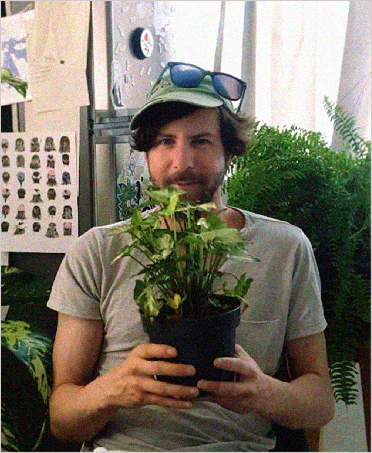
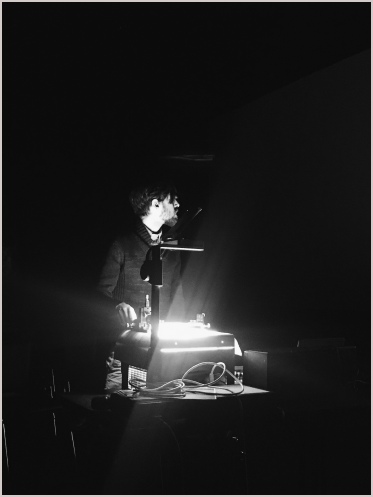
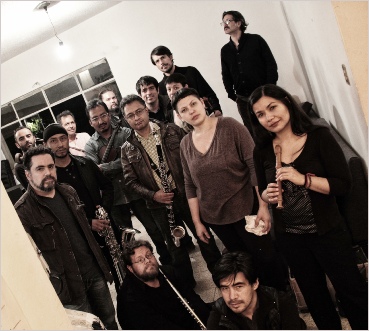
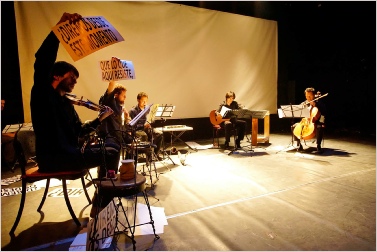
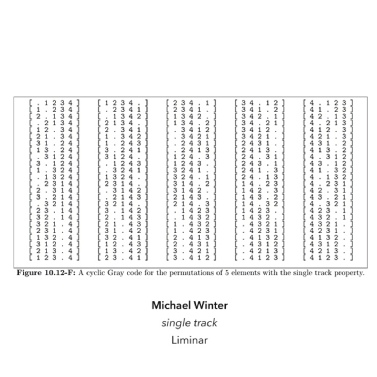
Michael Winter
Liminar
Liminar in concert